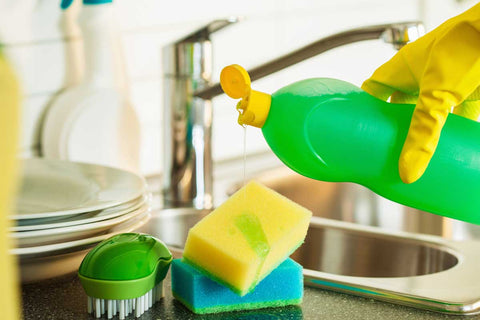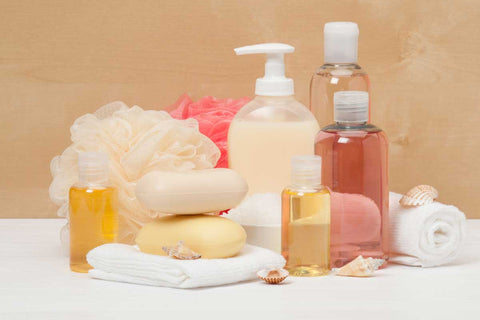How To Make Dish Soap at Home
There are numerous dishwashing liquids on the market, but most contain chemicals that can cause more harm than good. Don't worry; we'll make a non-toxic, all-natural dish wash with just a few ingredients and simple instructions.

Homemade Dish Soap Recipe is also eco-friendly, biodegradable, and skin-friendly. Natural dish cleaner that is both sustainable and zero-waste. Let's get started on How To Make Natural Dish Soap At Home.
DIY Dish Soap Recipe - Step By Step
A decent homemade natural dish soap may safely and efficiently eliminate the germs your dishes attract. Here's a quick and easy recipe for producing homemade dish soap that smells amazing, cuts oil, and only needs a few ingredients. Let's look at this easy-to-follow recipe for homemade natural dish soap.
Ingredients:
- Organic Castile Soap Base - 1/4 Cup
- Water - 2 Cups
- White Vinegar - 1-2 Teaspoons
- Vegetable Glycerin - 1 Teaspoon
- Lemon Essential Oil - 5 Drops
Directions:
Step 1: Slice the soap bar into pieces and add the details to the blender. After the parts are tiny enough, pulse, you can grate using a box grater if you don't have a blender.

Step 2: Place the water and grated soap into a pot and place them on the burner over medium heat.
Step 3: Once all the soap has melted into the boiling water, continue stirring the mixture. Never allow the mixture to boil. If it feels like it's starting to simmer or cook, reduce the heat.
Step 4: Remove the mixture from the heat once the soap completely melts into the water. Before moving forward, let it cool for a while.
Step 5: The warm water, soap, and vinegar mixture should be stirred. Glycerin can be omitted, but it does assist the mix in becoming thicker and feeling less watery.
Step 6: If you'd like, add a few drops of your preferred essential oil at this point.
Step 7: We used roughly five drops of lemon essential oil for its energizing aroma and added citrus cleaning power. Yet, there are no restrictions on smell selection. Whether you prefer lavender, peppermint, tea tree, lemongrass, eucalyptus, grapefruit, or something else different is entirely up to you!
Step 8: Pour the mixture into your favorite soap dispenser after letting it cool completely in the pot. Your recipe for homemade dish soap is prepared.
How To Use Homemade Dish Soap?
Step 1: Let's start by clarifying that this soap should only be used when washing dishes by hand and not in a dishwasher: Dawn or another of your preferred choices.

I advise including a quarter cup of salt in the recipe if your water is hard. Even though this homemade soap won't suds up as much as regular store-bought dish soap, it still does the same function.
Step 2: My handmade dish soap is thinner, or lack thereof, compared to shop items. More delicate than the store-bought soaps you're used to, this one. Although thicker soap may look opulent, glycerin serves the same purpose. By adding this transparent liquid oil to your mixture, you should be able to overcome the problem and obtain the desired texture.
Step 3: First, filling the sink and soaking the dishes is NOT the suggested soaking technique for this soap. Instead, lather the soap onto a damp sponge and begin cleaning. Also, you'll use less water with this method because most people prefer to overfill sinks when washing their dishes by hand. Scrape your dishes in advance to eliminate food residue as another water-saving trick.
Conclusion
In conclusion, making your dish soap is an excellent option if you want a natural dishwashing solution that is safe and smells great. Dish soap is simple to create, fantastic at fighting bacteria, and chemical-free, making it the ideal natural product for cleaning dishes. Use the cleanest ingredients to create homemade dish soap that is chemical-free. With VedaOils, you may get the best, most pure substances. Please visit VedaOils.com.
Frequently Asked Questions
Here are some frequently asked questions about Homemade Dish Soap!

Q1: How long does homemade dish soap last?
Ans: This soap can be used forever after it is prepared. However, once you start using a bar, finish it within six months. An unopened bar should be kept dry and at room temperature until used. There are better places to store homemade soap than a sealed container.
Q2: What will you use to make homemade dishwashing soap?
Ans: Making homemade dish soap is effortless: combine equal parts warm water, white filtered vinegar, and essential oil, as well as some salt for thickening.
Q3: What happens when you mix dish soap and water?
Ans: It is attracted to both water and oil molecules. Oil droplets are suspended in the water due to detergent grabbing onto both sorts of molecules. The detergent molecules bind the water and oil together when you shake the jar, creating an emulsion.
You May Also Like:
Buy Products
-
 Castile Soap Base
Castile Soap Base -
 Lavender Essential Oil
Lavender Essential Oil -
 Lemon Essential Oil
Lemon Essential Oil -
 Lemongrass Essential Oil
Lemongrass Essential Oil -
 Vegetable Glycerin - 99.7% Grade (Food Safe)
Vegetable Glycerin - 99.7% Grade (Food Safe)
Related Articles
Disclaimer :- This article is intended for informational and educational purposes only and should not be considered a substitute for professional medical advice. For specific health concerns or treatment, please consult your personal physician. The article's editor, writer, and VedaOils organization do not assume any responsibility for any health outcomes resulting from the information provided. Readers are strongly encouraged to seek advice from their physician before acting on any recommendations made in these articles.
















 Sign in
Sign in Register now
Register now My Reward Points
My Reward Points









